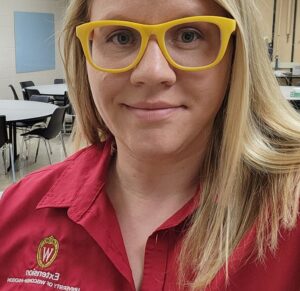Vernon County 4-H History
HISTORY OF 4-H IN VERNON COUNTY
4-H, as we know it, began around 1900 as a means of reaching parents with improved farm and home practices. American farmers had experienced poor economic times for 30 years. It was risky business for them to try a newly recommended farm practice. In 1902, a few midwestern school teachers developed some crop demonstrations with their students who in turn shared their successes with their parents.
These school projects developed small groups covering a single topic such as beef, corn, gardening, or canning. By 1909 some of these groups were called 3-H clubs, and in 1911 the name of 4-H was adopted. There were corn clubs in Wisconsin as early as 1904.
The first county agents were hired about 1915 and the first Wisconsin State 4-H Leader was hired in 1914. A plan of organizing boys’ and girls’ agricultural clubs in Wisconsin was later adopted. This plan called for definite organization with the usual club officers, an adult leader, regular meetings, and a series of projects. Clubs were organized in schools and rural communities under the direction of the local teachers.
Have 4-H objectives changed since its early days? Yes!
Today the objective is the development of young people by providing a wide variety of learning opportunities in which all youth can participate. 4-H is for all youth, whether they live in the city or in the country.
Vernon County 4-H History
The 4-H program has been a part of the lives of thousands of youth and adults in Vernon County since 1922 when Agricultural Instructor R. A. Power traveled to rural schools and enrolled youth in garden, corn, dairy, and pig projects.
In March 1924, Miss Elizabeth Salter, Assistant State 4-H Club Leader, talked to the entire high school assembly in Viroqua. After the assembly, 65 girls enrolled as members of the first Girls Ag Club. Shortly thereafter, Mr. Power organized a Boys Ag Club and also assisted the girls club.
Mrs. Bertha Lauder, the wife of a Viroqua doctor, volunteered as the first general leader for the girls club with the help of Mrs. Phoebe Schelling and Mrs. Vic Shaeffer as project leaders of the new club. The president of that first Girls Ag Club was Olga Bennett who went on to become a prominent Viroqua attorney and judge.
The first year these two clubs organized, they held several social dances and sponsored a school fair.
The first community 4-H club organized outside of the school was the Bishop Branch Sewing Club organized in 1925 or 1926. One of the club’s first members, Merle Fish, now Mrs. Guy Primmer, was recognized in 1993 for having completed 50 years as a volunteer 4-H leader in Vernon County. She was recognized at the 1993 State 4-H Congress in Madison.
The 4-H program is a part of the educational mission of county-based University Extension staff who are employed jointly by Vernon County, the University of Wisconsin, and the United States Department of Agriculture. The Vernon County Board of Supervisors hired its first 4-H club county leader in the summer of 1928 for a three-month period. A full-time 4-H and Youth Agent has been a part of the University Extension staff in the county since the mid 1940’s. In 2018, the 4-H and Youth Agent was further defined and re-titled into a 4-H Educator.
The first 4-H Leaders Association was organized in 1935 with R.A. Power as president, a position he held for many years. The 4-H Leaders Association was organized by those serving the 4-H program as adult volunteers to help promote and raise funds to further the program in the county.
Interest in the 4-H program continued to grow. A probable high point in terms of number of members was about 1963 when Vernon County had 834 4-H members in 38 different community clubs. Projects and activities in which members became involved with, continue to change and expand. Currently youth have over 100 projects and activities from which to choose in an area that meets interests.
Vernon County Agents/Educators
Emery R. Bork 06/01/2018- present
Colleen B. Pulvermacher 9/1/04 to 2018
Susan R. Marino 04/10/89 to 05/14/04
Robert S. Fredrick 01/01/57 to 07/01/88
Judith Gates, interim 10/01/65 to 06/30/66
Alfred J. Hornby, interim 09/15/73 to 08/15/74
Alfred L. Finger 01/15/53 to 11/14/56
Lester E Glewen 03/25/47 to 11/30/52
Neilus R. Larson 02/15/46 to 12/31/45





